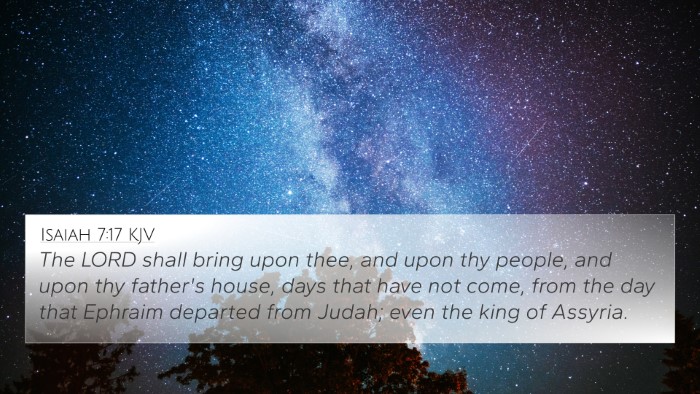Understanding 2 Chronicles 28:16
2 Chronicles 28:16 states, "At that time, King Ahaz sent to the kings of Assyria to help him." This verse reflects a moment of great distress for Judah under the leadership of King Ahaz. Here we provide an analysis of the meaning and context of this scripture, drawing from multiple public domain commentaries.
Contextual Analysis
This verse holds significant implications regarding Ahaz's relationship with God and the political alliances during his reign. Judah, afflicted by both internal strife and external threats, represents a recurring theme in the Old Testament of reliance on human power rather than divine intervention.
Commentary Insights
Matthew Henry's Commentary
Matthew Henry emphasizes the folly of King Ahaz's decision to seek assistance from Assyria, portraying it as a lack of faith in God's ability to deliver His people. He underlines that Ahaz's reliance on foreign powers leads to further compromise and idolatry, setting a precedent for future kings of Judah. Ahaz’s delegation to Assyria can be seen as a betrayal of the covenant God established with His people.
Albert Barnes's Notes
Albert Barnes points out that Ahaz's action signified a critical turning point in Judah's history, representing a distressing lack of trust in Yahweh. Barnes elaborates that by seeking help from the Assyrian kings, Ahaz not only compromised his faith but also invited foreign influence into the sacred polity of Israel. This action led to a myriad of consequences that would echo throughout the subsequent narratives.
Adam Clarke's Commentary
Adam Clarke gives an in-depth analysis of the political ramifications of Ahaz's decisions. Clarke states that appealing to Assyria was a desperate measure in a time of grave danger, showcasing Ahaz's limited understanding of steadfastness in divine faith. Furthermore, Clarke notes that this decision opens the door to future oppression as Assyria later exerted dominance over Judah.
Thematic Connections
This verse reverberates through the larger narrative of the Old Testament, emphasizing themes of faith versus fear, the consequences of unfaithfulness to God, and the dangers of seeking help from secular powers rather than trusting in divine providence. To deepen understanding, we can examine cross-references and thematic connections across scripture.
Bible Verse Cross-References
- Isaiah 7:1-2 - King Ahaz’s fear of the kings of Israel and Syria aligns with his decision to seek Assyrian assistance.
- 2 Kings 16:7-8 - Further accounts of Ahaz seeking help from Tiglath-Pileser, demonstrating his political maneuvering.
- 2 Chronicles 28:20 - Relates to Ahaz's reliance on Assyria, presenting further context to the damaging alliance.
- Psalm 146:3 - A warning against putting one’s trust in princes, correlating with Ahaz’s misplaced trust.
- 2 Kings 15:37 - Highlights the political instability in the region, which influenced Ahaz's actions.
- Micah 1:1-5 - Links to the prophetic messages given during the reign of Ahaz, addressing the consequences of abandoning God.
- Isaiah 30:1-3 - A direct rebuke of those who rely on Egypt (a parallel to Ahaz's reliance on Assyria).
Practical Implications
The implications of this verse extend beyond historical context, offering lessons on faith, trust, and decision-making in our lives today. Much like Ahaz, individuals may find themselves at a crossroads, facing daunting challenges and tempted to seek solutions through less righteous avenues.
Tools for Bible Cross-Referencing
Utilizing tools like a Bible concordance or a Bible cross-reference guide can immensely assist in digging deeper into the connections between verses like 2 Chronicles 28:16 and others. This practice is invaluable for those who want to understand the full tapestry of biblical themes.
Concluding Thoughts
The study of 2 Chronicles 28:16 challenges believers to contemplate their reliance on worldly solutions when facing crisis. By employing cross-referencing Biblical texts, believers can fortify their understanding of scripture and draw lessons applicable to their daily lives. The interconnectedness of the Bible emphasizes a unity that invites exploration and reflection.
Encouragement for Further Study
For those looking to deepen their study of scripture, exploring how to find cross-references in the Bible can unveil rich layers of meaning throughout God’s Word. As you reflect on the decisions made by King Ahaz, consider how they resonate within your own life. Equip yourself with tools and resources to engage with the text, fostering a richer relationship with the scriptures.





